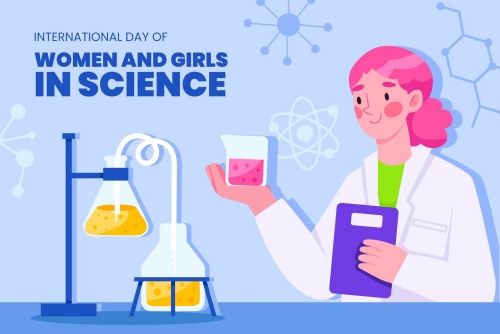
Message from Ms. Audrey Azoulay, Director-General of UNESCO, on the Occasion of the International Day of Women and Girls in Science文章源自英文巴士-https://www.en84.com/15224.html
教科文组织总干事奥德蕾·阿祖莱妇女和女童参与科学国际日致辞文章源自英文巴士-https://www.en84.com/15224.html
文章源自英文巴士-https://www.en84.com/15224.html
11 February 2024文章源自英文巴士-https://www.en84.com/15224.html
2024年2月11日文章源自英文巴士-https://www.en84.com/15224.html
文章源自英文巴士-https://www.en84.com/15224.html
At a time of climate change, green transition and the emergence of new technologies, the world needs more science; but science also needs more women.文章源自英文巴士-https://www.en84.com/15224.html
文章源自英文巴士-https://www.en84.com/15224.html
在气候失调、绿色转型和新技术涌现之时,世界更需要科学,科学也更需要女性的参与。文章源自英文巴士-https://www.en84.com/15224.html
文章源自英文巴士-https://www.en84.com/15224.html
Yet it is at these crucial moments for our future, when scientists are particularly needed, that gender inequalities in science are most keenly felt.
然而,正是在这种对我们的未来至关重要的时刻,在我们尤其需要科学家的时期,我们更加深切地感受到了科学领域的性别不平等。
According to the latest UNESCO Science Report, women currently make up only a third of scientists and 37% of ocean science professionals. In all scientific fields women face a glass ceiling.
根据教科文组织最新的科学报告,女性现仅占科学家的三分之一;只占海洋科学专业人员的37%。在所有科学领域,女性都切实面临玻璃天花板的问题。
We must realize, however, that society as a whole – and not just women – suffers from these inequalities, because fewer scientists also means fewer scientific innovations, fewer medical discoveries and less sustainable development.
然而,我们必须认识到,这些不平等影响的不仅仅是女性,更是整个社会:因为科学家的不足也意味着科学创新不足、医学发现不足和可持续发展不足。
Therefore, on this International Day of Women and Girls in Science, UNESCO would like to draw the international community’s attention to these profound imbalances and invite it to seize the opportunity offered by the International Decade of Sciences for Sustainable Development (2024-2033) to strengthen scientific culture in society by focusing in particular on the training of girls and women.
正因如此,值此妇女和女童参与科学国际日,教科文组织希望提请国际社会关注这些深层的不平衡现象,并以“科学促进可持续发展十年(2024—2033年)”为契机,加强社会的科学文化,重点关注女童和妇女培训。
Without delay, and as of now, UNESCO is taking action in the field to promote and recognize the talent of women researchers.
教科文组织早已在实地行动起来,宣传并认可女性科研人员的才华。
One example is our flagship L’Oréal-UNESCO “For Women in Science” Programme. The year 2023, which marked the Programme’s 25th anniversary, was an opportunity to pay tribute to the 127 laureates and 3,900 young scientists from 115 countries whom the L’Oréal-UNESCO Prize “For Women in Science” has promoted since its inception. Among them, two researchers were recently awarded Nobel Prizes: Franco-Swedish physicist Anne L’Huillier, winner of the Nobel Prize in Physics, and Hungarian-American biochemist Katalin Karikó, winner of the Nobel Prize in Physiology or Medicine. UNESCO strongly applauds them both once again.
这正是我们与欧莱雅合作开展妇女与科学旗舰计划的意义所在。2023年是该计划设立25周年,我们借此机会向欧莱雅—教科文组织妇女与科学奖自设立以来给予支持的来自 115个国家的127名获奖者和3900名青年科学家致敬。她们当中有两人于近期荣获诺贝尔奖:一位是获得诺贝尔物理学奖的法国/瑞典物理学家安妮·吕利耶,另一位是获得诺贝尔医学奖的匈牙利科学家卡塔琳·考里科。教科文组织再次向她们致以热烈的祝贺。
Women’s access to scientific careers, however, starts well upstream, from the first years of schooling. Every day, UNESCO is committed to breaking down stereotypes and self-censorship, boosting girls’ self-confidence and giving them a scientific culture and education from primary and secondary school onwards.
然而,为女性投身科学事业创造良好条件必须尽早抓起,从上学的最初几年就开始。教科文组织每天都在为此不懈努力,从小学和中学阶段开始,消除陈规定型观念,打破自我审查现象,增强女童的自信心,并努力为她们提供科学文化和科学教育。
This is the aim of our partnership with the University of the West Indies (UWI) in Jamaica: together, we have launched the “UNESCO-UWI Walking in Her Footsteps” mentorship programme in science and technology for Jamaican secondary schoolgirls. In addition, through the Capacity Development for Education Programme (CapEd), we have already trained over 2,000 women teachers in science and gender issues in Burundi, Niger and Uganda.
这正是我们与牙买加西印度大学合作的宗旨所在:我们共同发起了一项面向牙买加初中和高中女生、名为“沿着她的足迹”的科技辅导计划。此外,我们还通过教育能力建设计划,为布隆迪、尼日尔和乌干达的2000多名女教师进行了科学和性别平等问题方面的培训。
To conduct its work, UNESCO can also draw on the Recommendation on Open Science, unanimously adopted in November 2021 by our Member States, which underlines the urgent need to make science education more accessible and inclusive, particularly with regard to women. To date, 11 countries have incorporated the principles of this Recommendation into their national science policies.
教科文组织还依托《开放科学建议书》开展行动,这份于2021年11月由会员国一致通过的建议书强调,迫切需要提高科学教育的可及性和包容性,特别是对女性而言。目前,已有11个国家将该建议书的原则纳入到国家科学政策当中。
In the same vein, UNESCO is helping 10 countries in Europe, Africa and Latin America to apply the principles of the Recommendation in their laws and scientific and educational policies.
同样,教科文组织还为欧洲、非洲和拉丁美洲的10个国家提供支持,帮助它们将该建议书的各项原则落实到科学和教育法律和政策之中。
On this International Day, society as a whole must unite in support and appreciation of the women and girls who are breaking the glass ceiling, embarking on scientific careers, and moving the world forward through their research.
值此国际日,整个社会都应携手努力,为那些打破玻璃天花板、投身科学事业、通过自己的研究推动世界发展的妇女和女童给予支持和肯定。

